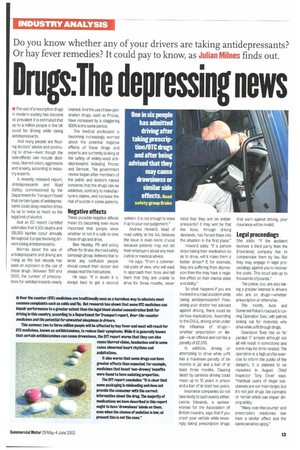Do you know whether any of your drivers are taking
Page 13

If you've noticed an error in this article please click here to report it so we can fix it.
antidepressants? Or hay fever remedies? It could pay to know, as Julian Milnes finds out.
ru s:The depressing news
• The use of prescription drugs in modern society has become so prevalent it is estimated that up to a million people in the UK could be driving while taking antidepressants.
And many people are flouting doctors' advice and continuing to drive—even though the side-effects can include dizziness, blurred vision, aggression and anxiety, according to industry experts.
A recently released report, Antidepressants and Road Safety, commissioned by the Department for Transport found that certain types of antidepressants could delay reaction times by up to twice as much as the legal limit of alcohol.
And an EC report Certified estimates that 4,500 deaths and 135,000 injuries occur annually throughout Europe involving drivers taking antidepressants.
Worries about the use of antidepressants and driving are rising as the last decade has seen an explosion in the use of these drugs. Between 1991 and 2000, the number of prescriptions for antidepressants nearly trebled. And the use of new-generation drugs, such as Prozac, have increased by a staggering 800% in the same period.
The medical profession is becoming increasingly worried about the potential negative effects of these drugs and experts are currently looking at the safety of widely-used antidepressants including Prozac and Seroxat. The government review began after members of the public and doctors raised concerns that the drugs can be addictive, contrary to manufacturers claims, and increase the risk of suicide in some patients.
Negative affects
These possible negative effects mean it's becoming even more important that people know whether or not it is safe to take these drugs and drive.
Ben Heatley, PR and policy officerfor Brake, the road safety campaign group, believes that to avoid any confusion people should consult their doctor and always read the instructions.
He says: "If in doubt it is always best to get a second opinion. It is not enough to leave it up to your own judgement."
Andrew Howard, head of road safety at the AA, believes the issue is even more crucial because patients may not tell their employers about any medication or medical advice.
He says: "From a commercial point of view, who will want to approach their boss and tell them that they are unable to drive for three months, never mind that they are on antidepressants? It may well be that the boss, through driving demands, has forced them into the situation in the first place."
Howard adds: "If a person stops taking their medication so as to drive, will it make them a better driver? It for example, they are suffering from depression then this may have a negative effect on their mental state and ability."
So what happens if you are involved in a road accident while taking antidepressants? Presuming your doctor has advised against driving, there could be serious implications. According to the DVLA, driving while under the influence of drugs— whether prescription or illegal—is an offence and carries a penalty 0112,500.
In addition, driving or attempting to drive while unfit has a maximum penalty of six months in jail and a ban of at least three months. Causing death by careless driving could mean up to 10 years in prison and a ban of at least two years.
Insurance companies do not take kindly to such events either. Leonie Edwards, a spokeswoman for the Association of British Insurers, says that if you crash your vehicle while knowingly taking prescription drugs that warn against driving, your insurance will be invalid.
Legal proceedings
She adds: "If the accident involves a third party then the [insurance] company has to compensate them by law. But they may engage in legal proceedings against you to recover the costs. This could add up to thousands of pounds."
The police, too, are also taking a greater interest in drivers who are on drugs—whether prescription or otherwise.
This month, Avon and Somerset Police's road unit is running Operation Toxic, with patrols looking out for motorists who drive while unfit through drugs.
Operation Toxic has so far yielded 17 arrests although not all will result in convictions and some may be drink related. The operation is a high profile exercise to inform the public of the dangers. It is planned to be repeated in August. Chief Inspector Tony Oliver says: "Habitual users of illegal substances are our main target, but it's not just drugs like cannabis or heroin which can impair driving ability.
"Many over-the-counter and prescription medicines can have a similar effect and the same penalties apply."
























































































































































